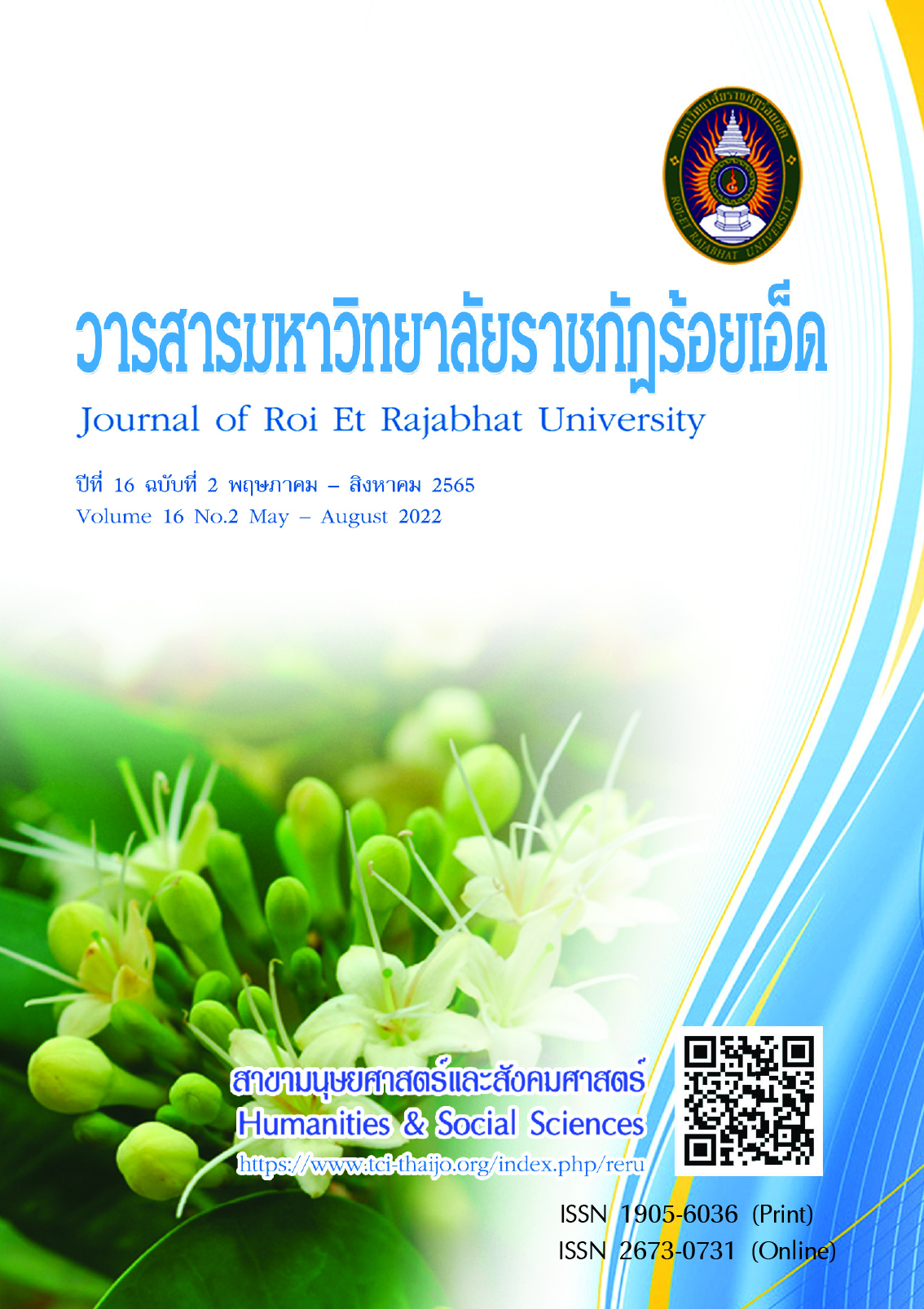Lost Memories
Keywords:
Memory, AmnesiaAbstract
This article discussed memory impairment. The objective was to comprehend how the brain functions in memory-related areas, abnormal memory, and how to prevent memory loss. This article demonstrated that memory loss is caused not only by aging atrophy of various brain regions, but also
by physical and psychological trauma. When memory loss occurred, individuals with memory loss should receive treatment and strictly adhere to their instructions. In addition, this article discussed brain training
in conjunction with aromatherapy, an activity that combined physical and mental components. The results also revealed that this activity could improve memory as a result of enhanced brain function, restore the brain, and prevent permanent amnesia and dementia.
References
เจตนา วงษาสูง, ชนกพร จิตปัญญา และไกรศรี จันทรา. (2554). ผลของโปรแกรมการรับรู้ความจริงแบบบูรณาการต่อภาวะสูญเสียความทรงจำของผู้ป่วยหลังการบาดเจ็บที่ศีรษะ. วารสารพยาบาลทหารบก, 12(2), 46-52.
ดาราวรรณ รองเมือง, ฉันทนา นาคฉัตรีย์, จีราพร ทองดี และจิตติยา สมบัติบูรณ์. (2561). อุบัติการณ์ของการหกล้ม และปัจจัยที่มีความสัมพันธ์กับการหกล้มในผู้สูงอายุที่อาศัยในชุมชน จังหวัดสุราษฎร์ธานี. Journal of Phrapokklao Nursing College, 27(1), 123-138.
ทัศนีย์ เชื่อมทอง, เสรี ชัดแช้ม และปรัชญา แก้วแก่น. (2558). ผลของโปรแกรมคอมพิวเตอร์การกลอกตาสองข้าง แบบแนวนอนสำหรับเพิ่มการเรียกคืนความจำในวัยผู้ใหญ่ตอนต้น : การศึกษาคลื่นไฟฟ้าสมองสัมพันธ์กับเหตุการณ์. ดุษฎีนิพนธ์ ปรัชญาดุษฎีบัณฑิต สาขาวิชาการวิจัยและสถิติทางวิทยาการปัญญา. ชลบุรี: มหาวิทยาลัยบูรพา.
สมศักดิ์ เทียมเก่า. (2555). เกร็ดสุขภาพ. สืบค้นเมื่อ 6 มค. 2564, จาก http://haamor.com/th/สูญเสียความจำ
สุธัญญา พรหมสมบูรณ์ และสุชาดา กรเพชรปาณี. (2559). การตอบสนองทางสรีรวิทยาต่อกลิ่น. Research Methodology and Cognitive Science, 8(1), 1-19.
Ahn, S. H., Chung, J. Y., Choo, I. S., Lee, K. Y., Kang, H. G. and Han, S. W. (2016). Abstract WP230: No Difference of Cerebral Perfusion Between Transient Global Amnesia With and Without Acute Focal Lesion in Hippocampus. Stroke, 47(1), AWP230-AWP230.
Delia, D.C., Lucas, J.A. and Kopelman, M.D. (2000). Memory In: Fogel B.S., Schiffer R.B., & Rao S.M. (Eds), Synopsis of neuropsychiatry. Philadelphia: Lippincott Williams & Wilkins.
De Simoni, S., Grover, P. J., Jenkins, P. O., Honeyfield, L., Quest, R. A., Ross, E. and Patel, M. C. (2016). Disconnection between the default mode network and medial temporal lobes in post-traumatic amnesia. Brain, 139(12), 3137-3150.
Eysenck, M. W. and Keane, M. T. (2005). Cognitive psychology: A student's handbook. Taylor & Francis. Gidanan ganghair. 40plus.posttoday. database on the internet. Retrieved May 16, 2018, from http://www.thaihealth.or.th/partnership/Content/37790-6%วิธีดูแลสมอง%20ก่อนจะความจำเสื่อม.html
Goldstein, E. B. (2014). Cognitive psychology: Connecting mind, research and everyday experience. Belmont: Thomson Wadsworth.
Gómez, R. L. and Edgin, J. O. (2016). The extended trajectory of hippocampal development: Implications for early memory development and disorder. Developmental Cognitive Neuroscience, 18, 57-69.
Herring, M. P., Puetz, T. W., O’Connor, P. J. and Dishman, R. K. (2012). Effect of exercise training on depressive symptoms among patients with a chronic illness: a systematic review and meta-analysis of randomized controlled trials. Archives of Internal Medicine, 172(2), 101-111.
Lenton-Brym, A., Kurczek, J., Rosenbaum, R. S. and Sheldon, S. (2016). A new method for assessing the impact of medial temporal lobe amnesia on the characteristics of generated autobiographical events. Neuropsychologia, 85, 35-43.
López-Frutos, J. M., Poch, C., García-Morales, I., Ruiz-Vargas, J. M. and Campo, P. (2014). Working memory retrieval differences between medial temporal lobe epilepsy patients and controls: a three memory layer approach. Brain and cognition, 84(1), 90-96.
Myers, D. G. (2010). Myers' psychology for AP. Macmillan.
N2N international. N2N Health Tip. database on the internet. Retrieved June 2, 2021, from http://www.n2nhealthshop.com/n2n-health-tip-สาเหตุของการสูญเสียความจำ-5
Rutten, J. L. (2017). Prevention is Better than Cure: Can Exercise Prevent Dementia?. Maastricht Student. Journal of Psychology and Neuroscience, 6(1), 1-12.
Scoville, W. B. and Milner, B. (2000). Loss of recent memory after bilateral hippocampal lesions. The Journal of neuropsychiatry and clinical neurosciences, 12(1), 103-a.
Kim, D., Kim, J. S., Jeong, W., Shin, M. S. and Chung, C. K. (2020). Critical area for memory decline after mesial temporal resection in epilepsy patients. Journal of neurosurgery, 134(2), 659-667.
Teipel, S. J., Bruno, D., Grothe, M. J., Nierenberg, J. and Pomara, N. (2015). Hippocampus and basal forebrain volumes modulate effects of anticholinergic treatment on delayed recall in healthy older adults. Alzheimer's & Dementia: diagnosis, assessment & disease monitoring, 1(2), 216-219.
Yamaoka, Y., Bandoh, M. and Kawai, K. (2016). Reversible hippocampal lesions detected on magnetic resonance imaging in two cases of transient selective amnesia for simple machine operation. Neurocase, 22(4), 387-391.
Downloads
Published
How to Cite
Issue
Section
License
Copyright (c) 2022 Roi Et Rajabhat University

This work is licensed under a Creative Commons Attribution-NonCommercial-NoDerivatives 4.0 International License.
บทความที่ได้รับการตีพิมพ์เป็นลิขสิทธิ์ของวารสารมหาวิทยาลัยราชภัฎร้อยเอ็ด
ข้อความที่ปรากฏในบทความแต่ละเรื่องในวารสารวิชาการเล่มนี้เป็นความคิดเห็นส่วนตัวของผู้เขียนแต่ละท่านไม่เกี่ยวข้องกับมหาวิทยาลัยราชภัฎร้อยเอ็ด และคณาจารย์ท่านอื่นๆในมหาวิทยาลัยฯ แต่อย่างใด ความรับผิดชอบองค์ประกอบทั้งหมดของบทความแต่ละเรื่องเป็นของผู้เขียนแต่ละท่าน หากมีความผิดพลาดใดๆ ผู้เขียนแต่ละท่านจะรับผิดชอบบทความของตนเองแต่ผู้เดียว





